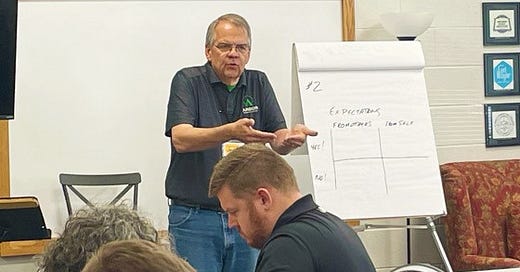Welcome back (or welcome)!
This is a short issue. A question and an affirmation.
+++
What would help you be helpful?
I read and write all the time. I know at least some of what I’ve learned. And I know what I’ve told you.
But I don’t know what you don’t know and need to know. So here’s an invitation for you to let me know.
When you go about supporting people in grief, what do you wish you had available to you?
It could be answers to any of the following:
What resources do you need?
What curation would be helpful (These are the books for this kind of situation)?
What perspectives would be helpful?
What kind of resources – examples, lists, things to hand to someone?
You can make a comment, or you can reply to this email.
+++
Maybe you are mostly okay
I was invited to do a workshop on healthy rhythms for a conference this week. I talked about several things I talk about all the time. Tendencies and spiritual temperaments. The Dual Process Model of coping with bereavement. The daily, weekly, monthly, yearly, regular, and once in a lifetime routines of Nehemiah. A couple other things.
It was a packed hour.
The next morning, I said to Nancy, “I forgot an important thing. To tell them that their rhythm may already be healthy.”
Often, we lead and attend workshops because we think something is wrong. We think, “I’m not always happy, I’m having a hard time, I must be doing something wrong.”
But here’s the thing. You can have a healthy rhythm and not be happy, not all the time. And you can probably be happy and not have a healthy rhythm.
So happy isn’t the measure of healthy.
I’m not going to spend time on what healthy means right now, or on bullet-pointed lists.
Just this word for this week.
You are handling this life better than you think.
+++
Thanks for the responses to my question: When you go about supporting people in grief, what do you wish you had available to you?
See you next week.
Jon






I'm walking with multiple family members who are in what I call "God's Waiting Room" - likely very near to death. And what I am interested in is resources/ways to encourage those in anticipatory grief. Also having loved a couple centenarians - I wondered what resources there are for those who experience longsuffering - who want to be with Jesus...but God chooses to leave here for quite an extended period of time. Today I'm going to a funeral for a dear friend who passed last Saturday at age 103. How can we encourage those who are waiting - especially when the waiting comes with extended physical and/or emotional suffering as well?
So, more succinctly: (1) Resources for those who are walking through anticipatory grief and (2) How to love well/support those who are enduring long suffering (whether that includes long life or just a great amount of time in pain and suffering)